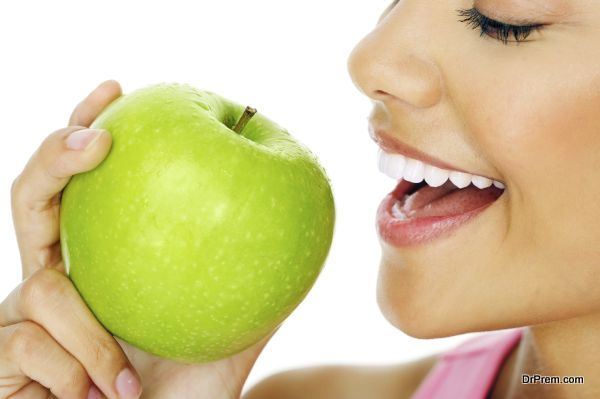Brushing, flossing and teeth whitening. These are all things we know are beneficial for our dental hygiene. Regular check-ups and cleanings at the dentist also top the list. But what about the foods we eat? From a young age, we’re told that too much sugar and candy will give us cavities. While this isn’t false information there’s also a lot more to it. In fact, while there are countless foods to avoid when promoting good oral health, there are also a handful of foods you should grab for. Keep reading to discover some of the best foods for your teeth and how to easily incorporate them into your diet.
1. Tea

Healthy teeth and gums isn’t just about what you eat. Drinking certain things can also help promote healthy dental hygiene. While some dentists recommend you steer clear of drinking too much tea or coffee (to avoid staining your teeth), tea in moderation can actually help prevent cavities and gum disease. Green and black tea, specifically, contain special compounds known as polyphenols.
These compounds are said to slow down the development of bacteria in the mouth, while also preventing groups of bacteria from forming. Just sipping the tea can work wonders for your dental health, but some people go as far as to rinse with black tea to help prevent plaque buildup. Not only can plaque and bacteria build up lead to cavities and other complications, but it’s also the main cause of bad breath.
2. Cheese and Yogurt
It’s no secret that both cheese and yogurt contain calcium, which is essential for bone health. But it also plays an integral role in the health of your teeth. Both these food items are also high in protein, which is a key ingredient in strengthening tooth enamel. Not only that, but chewing cheese has a similar effect to chewing apples — it produces saliva, promoting a clean, healthy mouth.
Cheese has also been linked to a decrease in tooth decay. Yogurt offers added benefits outside of just protein and calcium. Yogurt is packed with probiotics which are packed with good bacteria. This good bacteria makes it difficult for bad bacteria to thrive. Just be weary of flavored yogurts or even those marked “fat free”. Always check the sugar content and opt for plain yogurt whenever possible.
3. Leafy Green Vegetables

Popeye was right. Eating your spinach will make you grow big and strong. But perhaps he was talking about your teeth? That’s right — green, leafy vegetables like spinach (and a long list of others including kale, arugula, and chard), are filled with vitamins and minerals essential for healthy teeth and gums. It’s no surprise that these vegetables top every healthy food list out there, as they contain fiber, folate, vitamins B, C and K, iron, and calcium.
It’s these ingredients that make leafy greens great for oral health as well. We already know that calcium helps strengthen your enamel. Vitamin B may also help promote healthy gums, especially in pregnant women! Get creative with your recipes and add some greens to every meal.
4. Almonds
Another healthy protein on this list, almonds should be a staple in any diet. They offer a low-fat way to get plenty of protein and nutrients on the go. Great as a snack or added to your meal, the best thing about almonds is their versatility and low sugar content. One cup of almonds contains just over 3 grams of sugar. If you’re craving something sweet, opt for a small handful of these nutrition nuts over a sugary, processed snack. Not only will this benefit your teeth, but your overall health as well!
5. Carrots
 Not just good for your eyes, carrots are also known to promote healthy, strong teeth. Take a page out of Bugs Bunny’s book and start chowing down on these crunchy, orange veggies. Why? Not only are carrots packed with fiber, but similar to a few other foods on this list, they actually help stimulate saliva production and promote healthy gums. Another nutritional benefit of this vegetable is its high concentration of vitamin A. The best way to consume carrots to promote oral health is raw. That way, you get the most out of their crunchy texture.
Not just good for your eyes, carrots are also known to promote healthy, strong teeth. Take a page out of Bugs Bunny’s book and start chowing down on these crunchy, orange veggies. Why? Not only are carrots packed with fiber, but similar to a few other foods on this list, they actually help stimulate saliva production and promote healthy gums. Another nutritional benefit of this vegetable is its high concentration of vitamin A. The best way to consume carrots to promote oral health is raw. That way, you get the most out of their crunchy texture.
6. Raisins
Another sweet treat on the list, raisins can actually be mixed with almonds to make a super healthy and nutritious snack that feeds both your brain and body (and teeth)! Raisins, which are essentially dried grapes, raisins are the perfect way to satisfy your sweet tooth without the unwanted effects of sugar on your teeth and gums. Raisins also contain phytochemicals, which may help fight cavities and prevent the growth of certain bacterias.
7. Apples
 An apple a day keeps the doctor away. But who knew that it could also help keep your dentist happy? While it’s surprising to see a fruit on this list (since they are high in natural sugars), they offer added benefits that can’t be ignored. High in fiber and water, apples help produce saliva. Saliva is the unsung hero of oral hygiene. It helps to kill and clear out bacteria while also washing away unwanted food particles.
An apple a day keeps the doctor away. But who knew that it could also help keep your dentist happy? While it’s surprising to see a fruit on this list (since they are high in natural sugars), they offer added benefits that can’t be ignored. High in fiber and water, apples help produce saliva. Saliva is the unsung hero of oral hygiene. It helps to kill and clear out bacteria while also washing away unwanted food particles.
It’s these particles that get stuck between teeth, causing plaque buildup and eventually tartar, the main culprit in the development of gum disease. Left untreated, gum disease can permanently damage the gums and jawbone, creating the need for affordable braces for adults. Speaking of health gums, the texture of apples is said to stimulate your gums, keeping them healthy. Apples can also take the place of brushing in a pinch (it’s always best to brush!).
While practicing common dental hygiene practices like flossing and brushing are of utmost importance, you can promote healthy, happy mouth just by incorporating (and eliminating) certain foods in your diet. Steer clear of anything too high in sugar and swap in one of these natural, sweet treats listed here. Be sure to also include plenty of protein-packed foods like cheese and yogurt. And as always, save room for your veggies!
Article Submitted By Community Writer




